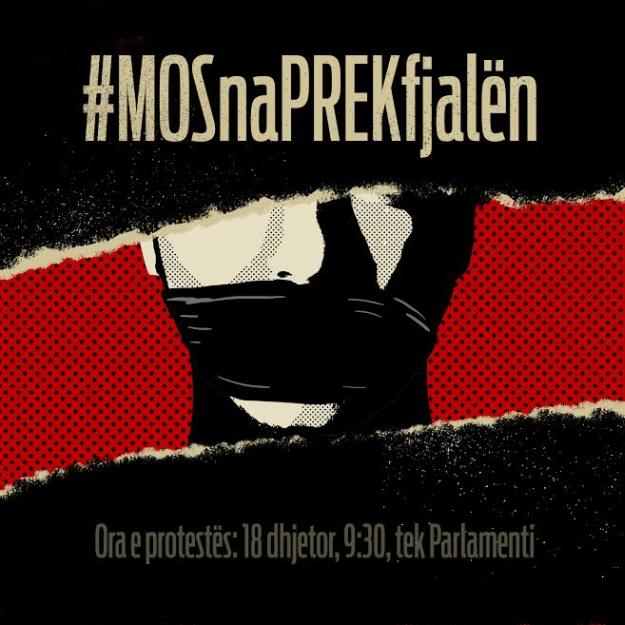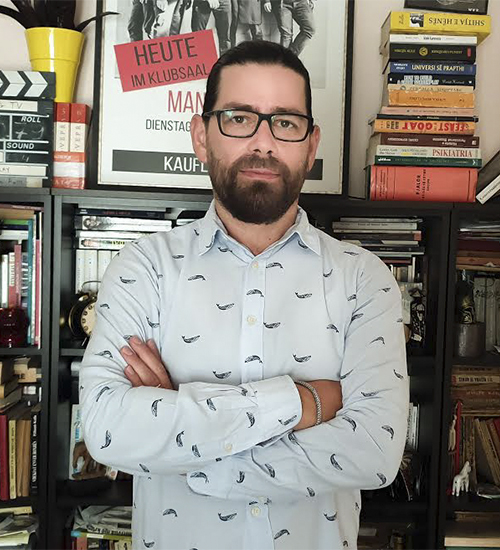In the midst of uncertainty, fear, chilling comparisons with the numbers of cases from around the world and shocking images from neighboring countries, Albania, like many other countries, is spending its days locked up in quarantine due to the COVID-19 pandemic.
Freedoms have been curtailed for a few weeks now, the curfew has tightened and new cases are confirmed day after day. As of a month ago, when the first infected individuals were identified (March 9), the usual daily routine has taken on a different form.
Among the government measures taken to prevent the continued spread of the virus, Albanian Prime Minister and head of the Socialist Party Edi Rama has utilized various methods to warn citizens about steering clear of risks.
“It’s Edi. Please wash your hands frequently. Do not leave the house for fun. Open your windows as much as you can. Beware of the media. Do not be afraid, but be very careful!” This was Rama’s “surprise” voice message that Vodafone telecom clients heard every time they placed a call one day in March.
Ironically, he himself fell prey to fake news during the pandemic. In a video he shared on Facebook, you could see police forces — Spanish, according to him — violently dispersing a crowd in order to prevent the spread of COVID-19. The video served as a warning for Albanian citizens: “Make your choice, because law enforcement officers have made up their minds, and they have the historic responsibility of acting without the slightest tolerance.”
What became obvious quickly was the fakeness of the news — the images were not from Spain, but from Algeria, where citizens were protesting against the governing elite every Friday for weeks.
Rama reacted later that day to the fake news piece, saying that the mix-up was unintentional and edited the post by deleting the word “Spain”; he did not delete the video because, according to him, the message still stands.
In spite of that, his campaign against the media is not good news for Albania.The term “defamation” was added to his public discourse in 2015 and it started assuming legal form three years later.
Also known as the Anti-Defamation Package, the two laws that aim to regulate online media were proposed for the first time in 2018. In another Facebook post, Rama said that these laws were being created to protect Socialist Party deputies, ministers, mayors — and even the prime minister himself — from defamation by the “political and media garbage bin.”
The money paid in court expenses, he said, would go toward an Education Fund, which would be established to support good students and educational institutions.
Opposition doesn’t hold water
Media organizations, civil society and other human rights organizations — Albanian and international — have appealed to deputies to vote against the draft laws regulating online media in Albania.
Believing that the proposed laws are an attempt by the government to put information under their full control, five media organizations requested their withdrawal in December 2018. A year later, 15 organizations made a joint appeal: “The necessity of self-regulation instead of legal regulation takes on a special importance in countries, such as Albania, where democracy is in transition and where media outlets are often connected to known business and political party interests.”
Although they did not receive a response, the activists continued with their efforts. On December 18, 2019, when the vote for the package was scheduled, journalists and members of civil society protested outside the Albanian Assembly. Holding placards, they expressed their objections to the control that would be given to the government through this legislation.

Mouths covered with black scarves, activists protested against the Anti-Defamation package in December 2019. Poster: Kleidi Eski.
Regardless of the resistance, the legal package was approved by a majority vote in the Assembly — of the 105 deputies in the hall, only 13 of them voted against one of the laws in the package, and 10 voted against the other. During his address at the Assembly that day, prime minister Rama called the protesters outside the Assembly “the main violators of human rights,” that bring about “catastrophic consequences” to society.
“If German law regulated journalists, the people that are at the Parliament’s doorstep, today they would all be indebted to pay an infinity of obligations as a result of human rights violations,” he said. “They are violators of society’s right to be protected by the catastrophic consequences of fake news and defamation!”
The package — Law No. 91/2019 that amends and supplements the law on audiovisual media and Law No. 92/2019 that amends and supplements the law on digital communications — gives the State Audiovisual Media Authority (AMA) the power to receive defamation complaints against digital media, examine them through a Council for Complaints (CC) formed within the entity, and issue penalties that are immediately issued, which can be appealed after they are executed.
During his address at the Assembly the day before the vote, Rama said that such a law allows for the swift enforcement of justice without the necessity of a judicial process that would take a few months. “I will not wait a whole year for the Court to explain to the public how an instance of defamation is affecting my public office today,” he said.
After it was approved in the Assembly, the Anti-Defamation Package was not ratified by President Ilir Meta.
Besar Likmeta, editor at the Balkan Investigative Reporting Network (BIRN), says that the prime minister’s wish to carry out justice quickly may lead to unfair decisions regarding the truthfulness of published news pieces.
“A few years ago we published data on the problems that some mayoral candidates have had with the law, and the prime minister threatened to take us to court for 100,000 euros and build a school with that money,” Likmeta says. “He did not take us to court and the facts that we published were later confirmed by state agencies, the Prosecution, and the [so-called] law ‘for decriminalization’ was passed.”
According to Likmeta, after BIRN reported on the criminal records of mayoral candidates, the Law No.138/2015 “For guaranteeing the integrity of persons who are elected, appointed or who carry out public office” was created so that people who were convicted of serious crimes do not run for office or are appointed to state institutions.
The journey doesn’t end here
After it was approved in the Assembly, the Anti-Defamation Package was not ratified by President Ilir Meta, and thus sent back for review. “The approval of these provisions essentially includes elements of direct censorship that restrict free speech and expression of the media,” he said on January 12, 2020.
The anti-defamation package legislates cooperation between the AMA and the Digital and Postal Communications Authority (DPCA), another state institution, so that internet providers can apply decisions made by the Council for Complaints according to the time limits and procedures stipulated by the law.
Since both of the laws were sent back by the President, Law No. 91/2019, which allows the AMA to regulate digital media, has now been suspended and is awaiting a comment by the Venice Commission, whereas Law No. 92/2019, which designates the DPCA as the executor of AMA decisions, has come into force.
Punishments stipulated against news content that may constitute “defamation” vary from correction of the news content, suspension or removal of media licenses, to fines as high as 8,000 euros.
International mechanisms such as Reporters without Borders, PEN International, the European Federation of Journalists and the European Center for Press and Media Freedom have criticized this package of laws, warning that “they will seriously impair free flow of information and will have chilling effect on online media and restrict Albanian citizens’ right to access information.”
Other international organizations focusing on media freedom, such as ARTICLE 19, the South East Europe Media Organization (SEEMO) and the International Press Institute (IPI), have joined the call to withdraw these laws, believing that the power given to the AMA would be “unprecedented in the demoratic world.”
Punishments stipulated by Law No.91/2019 against news content that may constitute “defamation” vary from correction of the news content, suspension or removal of the media licenses, to fines as high as 8,000 euros. An offense repeated three times within one year is punished with an increased fine of up to 50%.
Journalists pushed against the wall
Rama took Germany as a hypothetical example for the punishments that journalists would be subjected to for supposed violations of human rights “if German law regulated journalists.” However, Flutura Kusari, legal advisor at the European Center for Press Freedom in Leipzig, says that the Anti-Defamation Package is not in accordance with international mechanisms for the legislation of digital media.

According to media rights lawyer Flutura Kusari, media self-regulation is a practice in democratic countries. Photo courtesy of Flutura Kusari.
The main problem regarding this package, according to Kusari, is the substitution of media self-regulation with state regulation. “In most proper democracies like the United Kingdom, Germany, Belgium, etc., online media self-regulate; thus, the industry is organized through an entity that allows them to monitor themselves,” she says.
According to the Organization for Security and Cooperation in Europe (OSCE), the mechanism of self-regulation is independent from the political influence of governments and is created to preserve the quality of media production.This mechanism can lead to the creation of ethical codes, media councils and complaint commissions handling ethical violations.
Likmeta also says that media in Albania could regulate themselves through the Albanian Media Council (AMC), an independent organization of journalists created in 2015 that focuses on the promotion of self-regulation among online media outlets.This council has also raised numerous complaints regarding ethical violations by journalists.
According to him, the complaints that would be submitted to the AMA could not be assessed objectively and fairly since the time that the Council for Complaints has available — three days — is not sufficient to analyze all factors that could categorize a news piece as “untruthful.”
“Imagine, if a journalist writes a critical piece about the government, the government, the prime minister, the official, the oligarch — because complaints come from all directions — file complaints, and within 72 hours, without listening to any of the parties and without considering any evidence, this council is so capable as to reach a fair conclusion and issue a fine that is immediately executable,” he says.
Meanwhile, Socialist Party deputy and member of the Commission for Education and Means of Public Information at the Albanian Assembly, Milva Ekonomi, said in an interview for Euronews that, referring to international recommendations, the executive decisions made by AMA would enable the bypassing of criminal punishments related to defamation.
“If you consider the recommendations by the European Committee against Intolerance and Racism, the European Court of Human Rights also says that criminal punishment for defamation should cease to exist and be replaced with more procedural punishments,” she said.

Besar Likmeta, editor at the Balkan Investigative Reporting Network (BIRN), says that the legal package would have a censoring effect. Photo courtesy of Besar Likmeta.
According to Likmeta, the immediately executable punishments by the AMA would deprive journalists of the right to trial in cases when they consider the decision to be unfair. “Since two or three financial decisions could be executed within a week or month, it could block bank accounts, and this would make it impossible for the media to go to court because they would not have the financial means to do so,” he says.
Another problem tied to the measures that this package stipulates, according to Likmeta, is the effect that it would have on reporting. “It would not only have a direct impact on censorship, but it would also strengthen self-censorship, which is widespread in Albanian media,” he says.
“Albanian media [outlets] are not experiencing their best moment,” he continues. “This would have a “chilling effect” that would expand within the community of journalists in Albania, and that would lead to them not reporting critical news against the government and continue writing widespread routine news, or propaganda.”
Transparency is not a priority
Before they hit the streets in protest, the objections by human rights and media organizations were expressed in joint discussions and consultations, which were held the month before the laws were voted in the Assembly.
In a consultation held on December 11, 2019, media representatives accused the Socialist Party of developing a censorial legal framework, displaying a lack of transparency and extensive consultations during the phase when the drafts were drawn up.
This concern is also addressed by Kusari: “The draft laws were drawn up surreptitiously, away from the public eye — it was incredibly challenging for journalists in Albania to obtain the draft laws in order to analyze them afterwards.”
"A law for the media would help the courts, this is a law for the AMA that transforms the latter into a court.”
Koloreto Cukali, Albanian Media Council
“In a democratic country, the drafting process would have to be done in close consultation with civil society,” she continues. “Journalists and civil society should have access to all drafts, regularly and without any problems, so that they can inform the public about what is being served to them by the government.”
Koloreto Cukali, head of the Albanian Media Council, says that the Anti-Defamation Package is not in service to freedom of speech in Albania. “Ethics cannot become law” he says, explaining that the Code of Media Ethics in Albania was initially drawn up in 1996, and then later in 2006 by Albanian and foreign experts with the support of the European Union and the Council of Europe.
According to him, the anti-defamation laws would give the AMA judicial powers. “This is not a law for the media, a law for the AMA — so, while a law for the media would help the courts, this is a law for the AMA that transforms the latter into a court.”

Head of the Albanian Media Council Koloreto Cukali believes that the Anti-Defamation Package does not serve freedom of speech. Photo courtesy of Koloreto Cukali.
Kusari also thinks the designation of competences is suspicious: “The problem lies with the extraordinary power given to the AMA — a state body that is openly influenced by politics — that in the future will decide what is ethical, what is a news piece and what doesn’t constitute a news piece; what true and fake news are.”
According to Law 97/2013 “On audiovisual media in Albania,” AMA members are selected by the Assembly for a five-year period, and can be reselected once.“ [The] AMA is itself a seized institution — the majority of candidates running for president of the AMA are thoroughly political, as though they’re from the anteroom of the Prime Minister,” Cukali says.
Kusari also shares this concern, saying that the approval of this legal package would officially install a dictatorship in Albania. “AMA members are not independently selected now that there is a majority of Socialist Party members in the Albanian Assembly,” she says. Out of 140 deputies in the Assembly, 75 belong to the Socialist Party.
The earthquake that thickened censorship
After the tragedy of November 26, AKEP closed online portals such as Jeta Osh Qef (JOQ) and blocked an editorial by the “Dita” newspaper without a court order. What’s more, a citizen from Durrës was arrested after she shared an article that was deemed to have caused panic, she commented on the article: “Please leave Porto Romano. The drainage has cracked and gas deposits could explode if it [an earthquake] hits again. Leave!”
These actions were undertaken after Rama said on Twitter that within the state of emergency that was declared in Tirana and Durrës one day after the earthquake, he would be forced to “forcefully intervene” to close portals “that are spreading panic”.
Kusari believes that this sudden escalation is not a coincidence.
“Rama intensified and exploited the earthquake to smear journalists, to incite hate speech against them and to minimize their role in society,” she said. “All of this has not been planned well, it is a strategic approach so that the citizens and the public will not believe them when journalists report critically about Mr Rama.”
On November 30, 2019, Rama begged citizens not to read any portal, including outlets in Kosovo, and avoid TV.
“No to portals, no to digital toilets please, no them, pardon my language, but damn these toilets when you notice the strong scent of gloom, uncertainty, confusion and bewilderment that these so-called “sources of information” cause and how few human reflections and scientific reasoning are in the Albanian media market,” Rama said on his live video.
A few days later during a discussion, the Prime Minister once again pointed the finger at the media, calling them “criminal.” “Thousands of people have left Tirana, Durrës, why did they leave? What else should the media do, pull out guns?” he said.
On December 2, in a video Rama shared on his official profile, he called the media a “triplet” along with panic and anxiety. “This is what the unbearable triplets of this situation cause, they take hostage the hearts and minds of people who have been terrified by the destructive blow of Nature and the Media”, he said.
The same day, he warned the media on Twitter that he could do “what they can’t even imagine,” while during a meeting with residents affected by the earthquake in Durrës, he advised citizens to boycott the media or they would face consequences.
“Do not watch TV because it will make you resentful. Better to listen to the radio than watch TV. Or do it, and end up like that boy further up who heard on TV that the hospital in Durrës was falling to pieces and tried to take his father to another hospital. His father died on the way. Listen to the radio, if you ask me,” he said.K
Feature image: Kleidi Eski.





